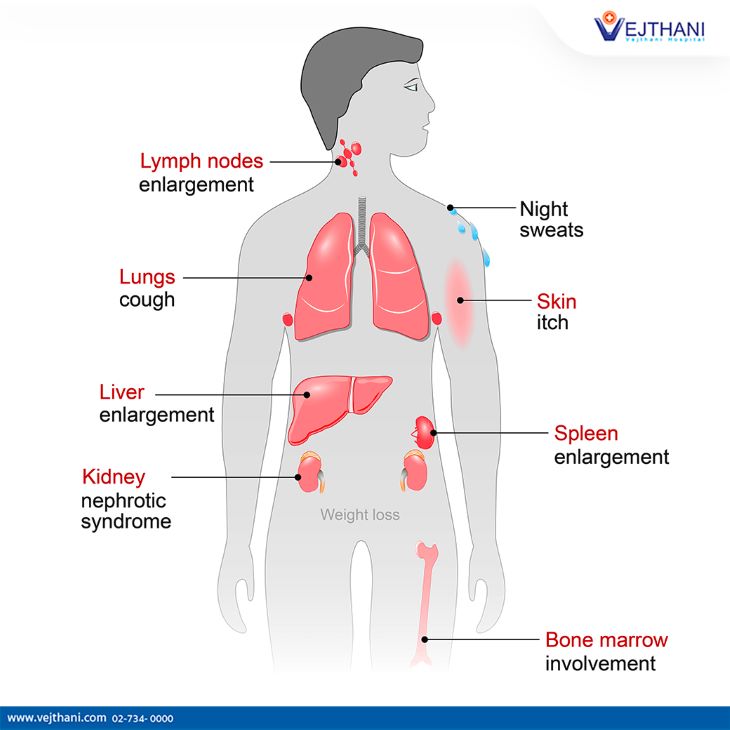August 6, 2024
Vejthani Hospital Provides Lymphoma Treatment in Thailand

Lymphoma is a type of cancer that begins in the lymphatic system when abnormal white blood cells start to grow. There are two main types of lymphoma, non-Hodgkin lymphoma, which accounts for about 90% of cases, and Hodgkin lymphoma. There are also over forty different kinds of non-Hodgkin lymphoma and two kinds of Hodgkin lymphoma, and they are treated differently.
Vejthani Hospital in Thailand can create a treatment plan for all types of lymphoma. If you are experiencing any of the symptoms of a lymphoma listed below, please make an appointment with a doctor at the Life Cancer Center at Vejthani Hospital. The sooner you start treatment, the better.
Symptoms of Lymphoma
The lymphatic system maintains fluid levels throughout our body, so there are lymph nodes located all over our body. This means the symptoms of lymphoma are diverse and may seem to be unrelated to the disease. The symptoms include:
- Swelling of the lymph nodes in the neck or armpits
- Fatigue
- Unexplained fever
- Swollen abdomen
- Loss of appetite
- Abnormal sweating, particularly at night
- Bruising or bleeding easily
- Weight loss
- Unexplained rashes and itching
- Frequent infections
- Chest pain, coughing, or breathing problems
If you are experiencing any of these symptoms that can’t be attributed to other factors in your daily life, please make an appointment with Vejthani Hospital’s Life Cancer Center.
Lymphoma Diagnosis
Your doctor will check for any swelling of the lymph nodes in your neck, armpit, and groin. They’ll also check for a swollen spleen and liver. The doctor may recommend that you undergo a lymph node biopsy. This involves removing all or part of a lymph node and testing it in the lab for the presence of lymphoma cells. If there are lymphoma cells present, a biopsy allows them to find out the type of lymphoma.
You’ll also be given a blood test to count the number of cells in your blood sample. The number can offer clues to the type of lymphoma you have. You may also be recommended for a bone marrow aspiration and biopsy. The sample is analyzed to look for lymphoma cells.
If your diagnosis is positive for the presence of lymphoma, your doctor may recommend imaging tests, such as an MRI, CT, and positron emission tomography (PET), to look for the extent of the cancer cells in other areas of your body.
Lymphoma Treatment
The ultimate goal of lymphoma treatment is to kill as many cancer cells as possible and send the lymphoma into remission. How that is accomplished depends on a number of factors, including your specific type of lymphoma, how much the disease has progressed, your overall health, and your preferences.
Active surveillance is often used in cases with a slow-growing type of lymphoma. You and your doctor may decide to wait until the symptoms interfere with your daily life before starting treatment.
Bone marrow transplants, or stem cell transplants, use high doses of radiation and chemotherapy to suppress your bone marrow. After the suppression, healthy bone marrow stem cells from other areas of your body or from a donor are infused into your blood and travel to your bones to rebuild your bone marrow.
Radiation therapy uses high-powered beams of energy, including protons and x-rays, to kill cancer cells. Chemotherapy uses powerful drugs to kill fast-growing cancer cells. Your chemotherapy can be administered intravenously or orally, depending on the prescribed drug.
Other treatments include targeted drugs focusing on specific abnormalities of the cancer cells and immunotherapy drugs that stimulate your own immune system to help kill cancer cells.
Visit the Life Cancer Center
The Life Cancer Center at Vejthani Hospital in Bangkok, Thailand, offers the most advanced lymphoma treatments. If you, or your loved one, are experiencing any of the symptoms associated with lymphoma, please make an appointment at the Life Cancer Center today.
August 1, 2024
Breast Cancer: Symptoms, Risk Factors and Detection
July 25, 2024



Call Us
Hi! How can we help you?